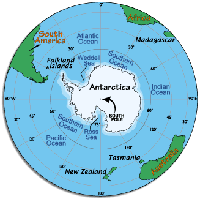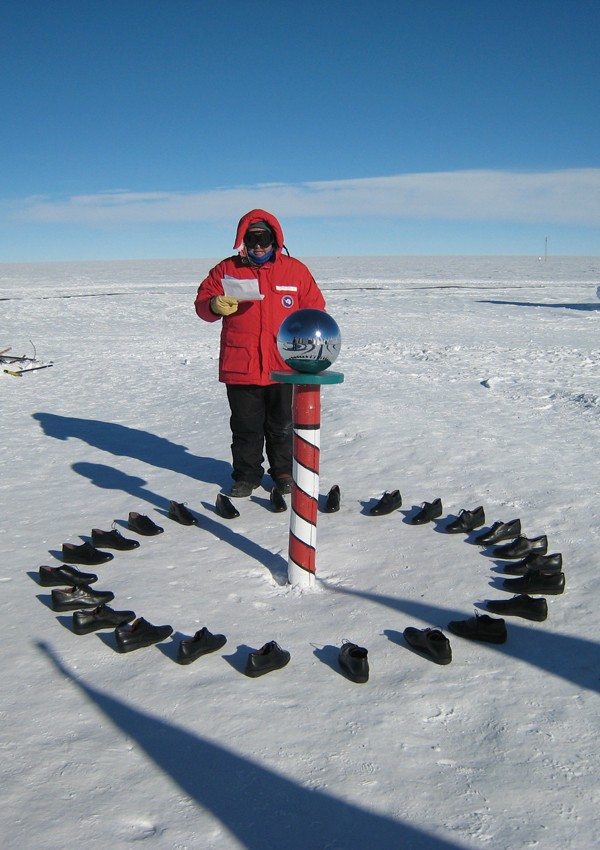Home » 2007 » Art in Antarctica » About The Longitudinal Installation
 I will place 12 pairs of shoes in a circle around the ceremonial South Pole as a temporary installation. Placing the shoes next to each other as a proxy for people across the globe, I aim to conceptually diminish the distance between them.
I will place 12 pairs of shoes in a circle around the ceremonial South Pole as a temporary installation. Placing the shoes next to each other as a proxy for people across the globe, I aim to conceptually diminish the distance between them.
— Xavier Cortada
 image: Xavier Cortada, The Longitudinal Installation (at the South Pole), 2007.
image: Xavier Cortada, The Longitudinal Installation (at the South Pole), 2007.
Miami artist Xavier Cortada purchased 12 identical pairs of black shoes and shipped them to Antarctica.
Cortada also captured newspaper quotes from people across the 24 time zones about the impact of climate change on their lives. (Please scroll down to read them).
In Antarctica, Cortada painted the approximate longitudes of the country in which the quote originated inside 24 shoes (so that in the South Pole each could be aligned with the longitude corresponding to the location on Earth where the voices originated).
To paint the shoes, Cortada mixed acrylic paint with soil samples from the Dry Valleys in Antarctica, one of the places on Earth most susceptible to climate change.
Cortada then flew to the South Pole and placed the 24 shoes inches apart in a circle along the South Pole, each aligned with its corresponding longitude as it converged on the South Pole.
The artist then walked to the 0 degree longitude, the prime meridian, and walked clockwise around the pole, stopping at each shoe to recite each of the following quotes :
0
Spain: “There may be a move of wineries into the Pyrenees in the future.”
— Xavier Sort, technical director of Miguel Torres Wineries.
15E
Switzerland: “Losses to insurers from environmental events have risen exponentially over the past 30 years, and are expected to rise even more rapidly still.”
— Pamela Heck, Insurance Industry Expert.
30E
Zimbabwe: “We used to be able to grow everything we want but that has all changed.”
— Matsapi Nyathi, Grandmother.
45E
Turkey: “We are helpless. We’re trying to rescue trapped people while also trying to evacuate flood waters that have inundated hundreds of houses.”
— Muharrem Ergul, Mayor, Beykoz district of Istanbul.
60E
Iran: “More than 90 percent of our wetlands have completely dried up.”
— Alamdar Alamdari, environmental researcher, Fars Province.
75E
Maldives: “In the worst case scenario, we’ll have to move.”
— Foreign Ministry spokesman Ahmed Shaheed.
90E
Tibet (China): “The Sherpas of Khumbu may not know everything, but they are suffering the consequences of the people’s greed. We mountain people should be careful and take precautions. If we don’t save Khumbu today our fresh water will dry up and the problem will be impossible to solve in the future.”
— Ngawang Tenzing Jangpo, the Abbot of Tengboche monastery.
105E
Borneo (Indonesia): “There’s been no rain, it’s horrible. The governor’s office has instructed schools and offices to close until further notice.”
— Hidayat, government official.
120E
Philippines: “The disaster covered almost every corner of this province – rampaging floods, falling trees, damaged houses. It happened very rapidly and many people did not expect this because they haven’t experienced mud flows in those areas before.”
— Fernando Gonzalez, governor of Albay province.
135E
Japan: “It’s no exaggeration to say that Japan faces a critical situation when describing the rapid decline of marine supply in its domestic waters that is linked to seaweed loss. Tengusa (seaweed) provides food for marine species.”
— Tomohiro Takase, head of the fisheries department at the Hachijojima municipality.
150E
(Great Barrier Reef) Australia: “In 20 years’ time, bleaching is highly likely to be annual and that will cause shallow-water corals to be in decline. We need to start working out how we can help people who rely on it for their income. It’s really quite a stunning fact.”
— Ove Hoegh-Guldberg, director of the Centre for Marine Studies at the University of Queensland.
165E
Micronesia: “We have nowhere to go.”
— Ben Namakin, Environmental Educator.
180
Tuvalu: “Tuvalu is the first victim of global warming.”
— Koloa Talake, former prime minister.
165W
Niue: “Yesterday morning we woke up to a scene of so much devastation, it was just unbelievable. Cyclone Heta was just so fast, furious and ruthless.”
— Cecelia Talagi, Government Secretary.
150W
Alaska (USA): “We are at a crossroads. . . Is it practical to stand and fight our Mother Ocean? Or do we surrender and move?”
— Shishmaref Mayor Edith Vorderstrasse.
135W
Yukon (Canada): “The weather is really unpredictable and the ice freezes much later and breaks up earlier. There are more incidents of hunters falling through the ice.”
— Kik Shappa, Hunter, Griese Fiord, Canada.
120 W
Nunavut (Canada): “Our cultural heritage is at stake here. We are an adaptable people. We have over the millennium been able to adapt to incredible circumstances. But I think adaptability has its limits. If the ice is not forming, how else does one adapt to seasons that are not as they used to be when the whole environment is changing underneath our feet, literally?”
— Sheila Watt-Cloutier, president of the circumpolar conference.
105W
Colorado (USA): “In Colorado, climate change means less snow, less water, more wildfires, less biodiversity and less economic opportunity, as there is less water available for development.”
— Stephen Saunders, president, Rocky Mountain Climate Organization.
90W
Nicaragua: “I closed my eyes and prayed to God.”
— Hurricane Mitch survivor Mariana González.
75W
Peru: “I tell my wife the day that mountain loses its snow, we will have to move out of the valley.”
— Jose Ignacio Lambarri, farmer, Urubamba Valley
60W
Argentina: “The flooding has forced us to redesign routes. We thought it would be for a short period of time, but it has been almost six years.”
— Carlos Avellaneda, manager of a trucking company.
45W
Brazil: “I am very frightened. One thing goes wrong, and the entire system follows.”
— Jair Souto, Mayor of Manaquiri.
30W
Greenland: “They tell us that we must not eat mattak [whale blubber], but this is all we know. Eating Inughuit food makes us who we are, and anyway we have nothing else to eat!”
— Tekummeq, Town of Qaanaaq.
15W
Mauritania: “We are only eating one meal a day. When there is not enough food, it is the young and the old that get fed first.”
— Fatimitu Mint Eletou, Bouchamo.
Placing the shoes next to each other as a proxy for people across the globe, I conceptually diminish the distance between them.
We are one global community. Creating this installation in a continent with no borders, the artist aims to diminish the man-made barriers in the world above it. Voices simultaneously stand in their place (longitude) around the world and inches away from one another.